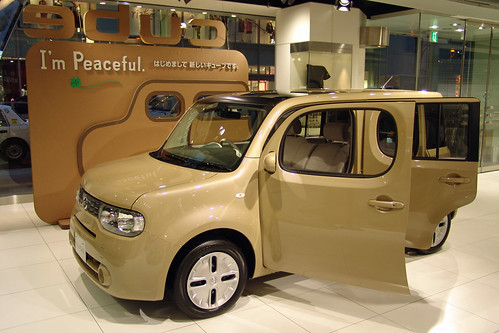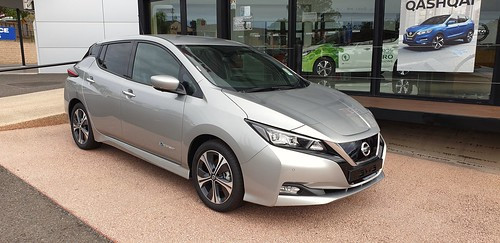Nissan, headquartered in Yokohama, Japan, stands as a global automotive powerhouse, renowned for its diverse portfolio of vehicles sold under the Nissan, Infiniti, and Datsun brands. These vehicles, encompassing cars, trucks, and SUVs, are meticulously designed to meet the demands of modern drivers and families, integrating cutting-edge safety and convenience technologies.
A common question among prospective buyers and automotive enthusiasts is: Where Is Nissan Made? The answer might surprise you. A significant portion of Nissan vehicles sold in the United States are, in fact, manufactured right within North America. These US-based assembly plants not only produce popular Nissan models but also contribute significantly to the local economies. Let’s delve deeper into the global footprint of Nissan’s manufacturing operations.
 Tan Nissan Cube at Japanese manufacturing plant
Tan Nissan Cube at Japanese manufacturing plant
Image via Flickr by MIKI Yoshihito. Alt text: A tan Nissan Cube is showcased at a manufacturing plant in Japan, highlighting Nissan’s origins and global production.
A Look into Nissan’s Heritage and Global Expansion
Nissan’s journey began in 1911 with the establishment of the Kaishinsha Motor Car Works in Japan, founded by Masujiro Hashimoto. While the company produced its first vehicles in 1914, it was in 1935 that the inaugural assembly plant was inaugurated in Yokohama. This original plant’s location now serves as the company’s global headquarters, a site open for tours for those keen to explore Nissan’s rich history.
The name “Nissan” itself emerged in 1928 with the formation of Nihon-Sangyo, a holding company that eventually encompassed Kaishinsha Motor Car Works. Nissan is a portmanteau derived from NIhon-SANgyo. Interestingly, early Nissan vehicles in the US market were sold under the Datsun brand. The Datsun name also carries historical significance, being a combination of the initials of the investors’ surnames – Den, Aoyama, and Takeuchi – who saw their creations as “sons of DAT,” hence “Datson,” later refined to Datsun.
Nissan’s Manufacturing Footprint in the United States
Since 1983, Nissan has demonstrated a strong commitment to the US economy by establishing and expanding its American assembly plant operations. Starting in Tennessee, Nissan’s US manufacturing has grown to an impressive capacity, producing over 1 million vehicles annually.
Smyrna Vehicle Assembly Plant, Tennessee
The Smyrna, Tennessee, Vehicle Assembly Plant holds the distinction of being Nissan’s first US manufacturing facility, opening its doors in 1983. This sprawling 6-million-square-foot plant employs over 6,700 individuals and has produced over 10 million Nissan vehicles to date. Nissan’s pioneering presence in Smyrna paved the way for other automotive manufacturers to establish operations in the region, significantly boosting the local economy. The Smyrna plant currently assembles a diverse range of Nissan and Infiniti models:
- Nissan LEAF (all-electric vehicle)
- Nissan Maxima
- Nissan Murano
- Nissan Pathfinder
- Nissan Rogue
- Infiniti QX60
Canton Vehicle Assembly Plant, Mississippi
Nissan’s Canton, Mississippi, Vehicle Assembly Plant has also made a substantial economic impact, contributing to over 25,000 jobs, both directly and indirectly, within the state. Notably, over half of the management positions at this 4.7-million-square-foot facility are held by minorities, earning Nissan recognition from Diversity, Inc. in 2018. Initially focused on domestic production, the Canton plant now manufactures vehicles for the global market. The models assembled here include Nissan’s popular trucks:
- Nissan Altima
- Nissan Murano
- Nissan NV (cargo van)
- Nissan Frontier
- Nissan Titan and Titan XD
Decherd Powertrain Assembly Plant, Tennessee
The Decherd, Tennessee, Powertrain Assembly Plant is central to Nissan’s engine production. This 1.1-million-square-foot facility, established in 1997, boasts an annual production capacity of 1.4 million engines. Beyond conventional engines, Decherd also manufactures the electric motors for the Nissan LEAF, highlighting Nissan’s commitment to electric vehicle technology. Engines produced at the Decherd plant include:
- 2.5-liter 4-cylinder (used in Altima, Rogue)
- 2.5-liter 4-cylinder SC (used in Pathfinder, Murano, QX60)
- 3.5-liter 6-cylinder (used in Frontier, NV, Patrol)
- 5.6-liter 8-cylinder (used in Titan, NV)
- eMotor (for LEAF)
 Silver Nissan car in front of international dealership
Silver Nissan car in front of international dealership
Image via Flickr by TuRbO_J. Alt text: A silver Nissan car is parked in front of an international dealership, representing Nissan’s global sales network and vehicle distribution from various manufacturing locations.
Japanese Manufacturing Hubs
While Nissan has a significant US production presence, many Nissan vehicles are still manufactured in Japan. These vehicles, destined for the US market, are imported and made available through local dealerships. Japan houses several Nissan assembly plants catering to both domestic and international demand.
The Tochigi Plant in Kaminokawa, Tochigi, is responsible for producing Nissan’s high-performance sports cars, the 370Z and GT-R. The intricate engineering and craftsmanship required for these top-tier vehicles necessitate highly skilled engineers and technicians at this plant. The Shatai Kyushu Plant in Yukuhashi, Fukuoka, focuses on crossover SUVs like the Rogue and Murano. For more entry-level models such as the Versa and Cube (though Cube production has ceased), and the sporty 350Z (also discontinued), the Oppama Plant in Yokosuka City, Kanagawa, is the primary manufacturing location.
Nissan’s Production in Mexico
Nissan also operates two assembly plants in Mexico. The Cuernavaca Assembly plant in Jiutepec is dedicated to producing the NV200 compact cargo van. Nissan Aguascalientes, located in Aguascalientes, Mexico, has a more diversified production line, manufacturing the Sentra, Versa, Versa Note, NV, and the Micra (also known as the March). The Micra, a supermini car, is not available in the US but is marketed in various international markets including Asia, Canada, Australia, the UK, and Mexico.
Recognized for Energy Efficiency
Nissan’s commitment extends beyond vehicle manufacturing to environmental sustainability. The EPA recognized Nissan as an Energy Star Partner of the Year in April 2021, awarding the company the Sustained Excellence award for the 10th consecutive year. This accolade acknowledges Nissan’s ongoing efforts to minimize environmental impact through energy-efficient facilities, reduced greenhouse gas emissions, and proactive energy management. Nissan aims for carbon neutrality by 2050, driven by technological innovation and sustainable practices.
Quality Manufacturing, Globally Delivered
Regardless of whether your new Nissan car, truck, or SUV originates from the US, Japan, or Mexico, you can expect consistent high-quality assembly, aesthetically pleasing designs, and meticulous attention to detail across the entire Nissan vehicle lineup. Furthermore, purchasing a Nissan in the US contributes to supporting local economies in Tennessee and Mississippi.
Explore Nissan Vehicles at Rydell Nissan of Grand Forks
Our knowledgeable team at Rydell Nissan of Grand Forks invites you to explore our showroom and experience the quality craftsmanship of Nissan vehicles firsthand. We offer a wide selection of Nissan models. Contact us today to schedule a test drive and streamline your purchase process with our online financing application.

